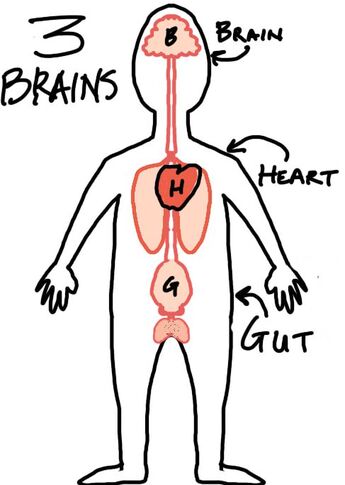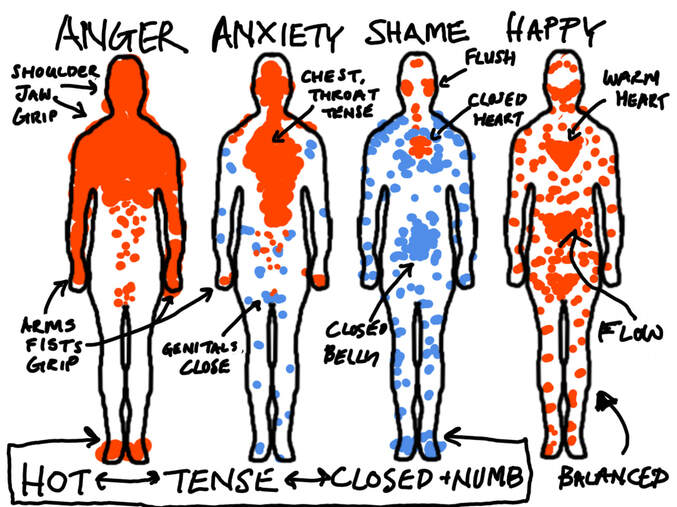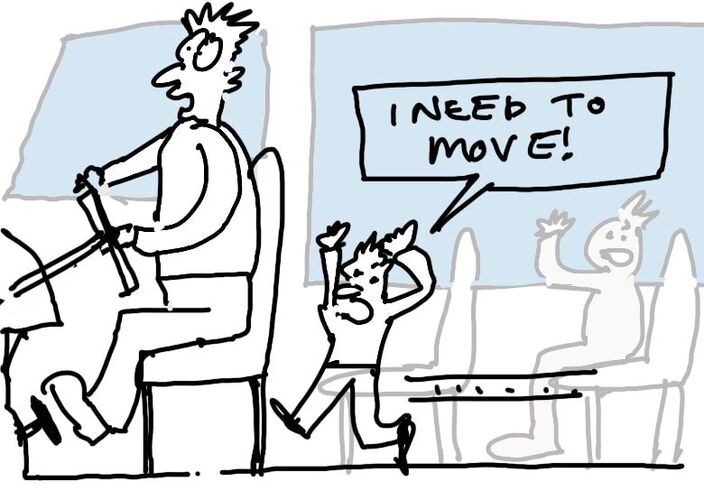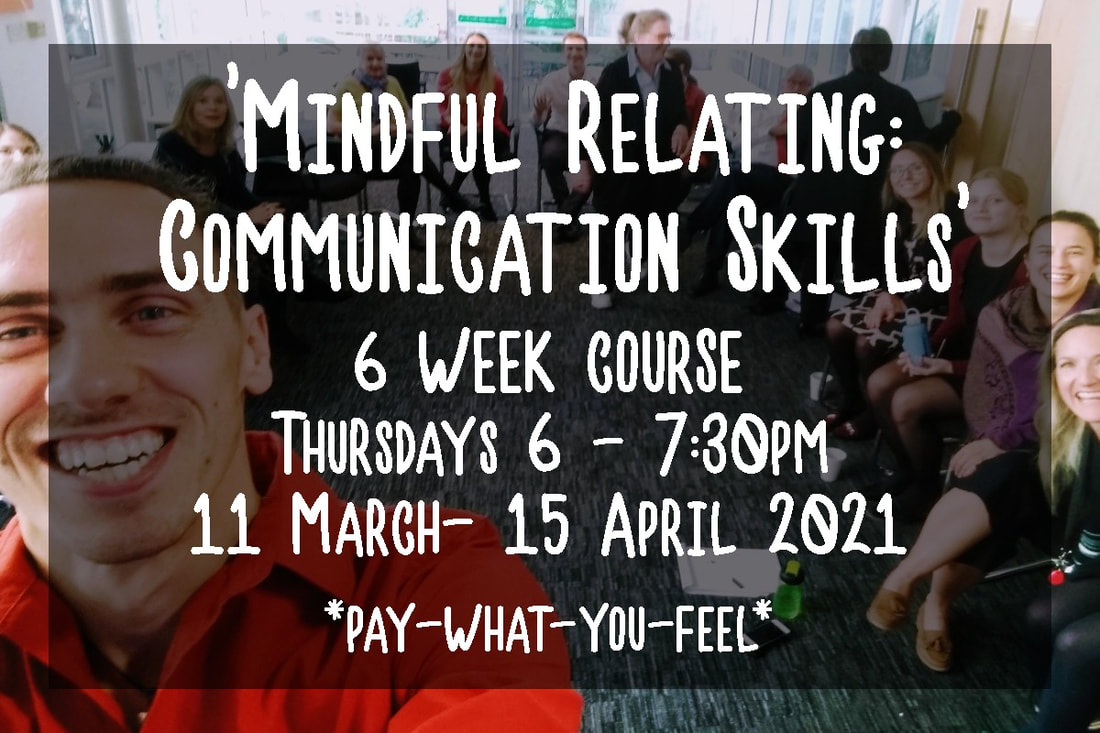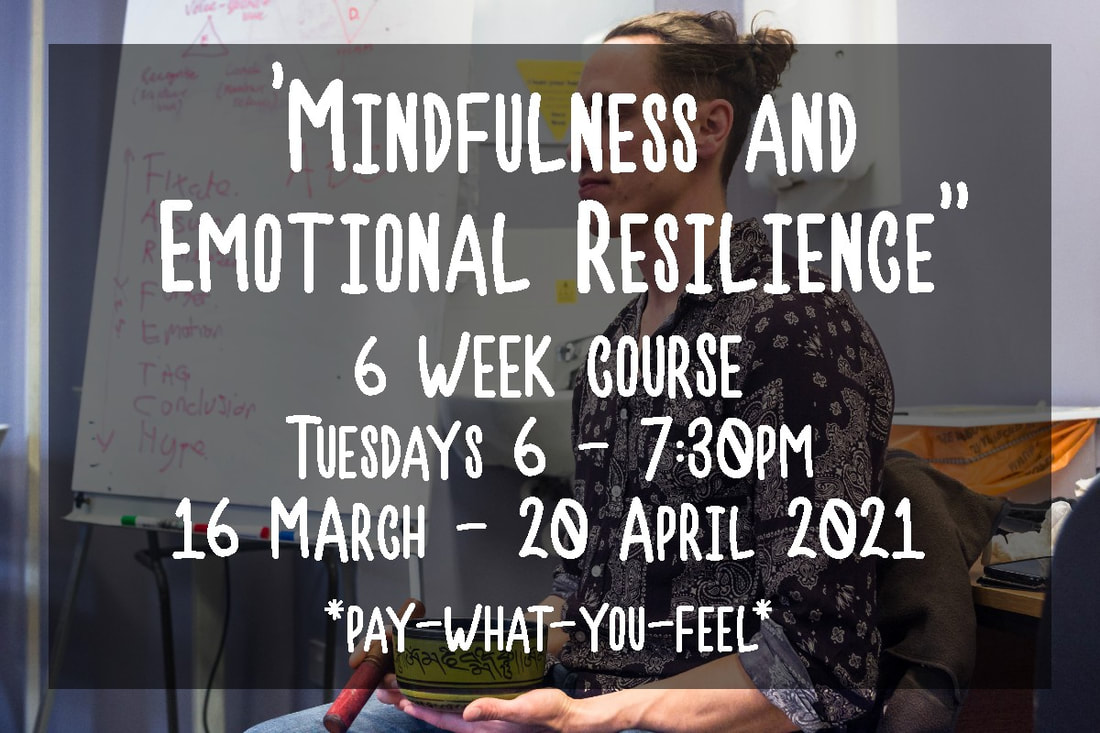TLDR: The main insights of this blog
- We evolved to move. Civilized socialisation teaches us to inhibit movement and overly rely on the conscious mind to solve problems.
- This disconnects us from instinct and intuition; our main source of power and motivation. We can become confused, fearful and unmotivated.
- Intuition and instinct speak through the body, via emotions and reactions. They are wise, but short sighted and they are trained by past experience.
- It's important to create space to listen beyond the 'noise' of all the mixed signals and acknowledge what is felt, but do believe or react, just acknowledge.
- With awareness we can play with our instinct to move, which can help us to discern the intuitive wisdom from the fearful interpretations and reactions.
- Once we have moved, felt and discerned the wisdom we can think more clearly with the rational mind, and move towards solving problems. If it is still stuck the tools I teach from ACT therapy can help.
MY RECENT EXPERIENCES
I wrote this blog as a reflection of three distinct experiences recently:
I wrote this blog as a reflection of three distinct experiences recently:
- The first was when I went to buy a car. The car seemed good, but I felt something wasn’t right when talking to the salesman. The telling sign was the feeling of pressure and discomfort- my intuition trying to communicate. I didn't listen. I ended up having a costly experience with an untrustworthy salesman.
- In another experience a friend was asking for help and I noticed feelings of pressure and fatigue emerge very quickly. This time I slowed down and as I watched the fatigue dissipate easily. Afterwards I felt a surge of energy and motivation, and it felt easy to offer help.
- In a third example I was getting frustrated during a discussion with my partner. This time I felt frustration and urges to move. Instead of trying to rationalise I slowed down, tuned in, and acknowledged my feelings, expressing: “I’m feeling frustrated! I don’t have the capacity for more talking… I need to move! Would you be willing to come and help me move this emotion so we can connect more?” I’m lucky enough to have a very open minded partner, who let me stop talking and go do some press ups, sit ups and chin ups. She even played with me by pummelling my chest and we growled together - it was really odd and really fun! It completely changed the energy in us bot. We ended up connecting in a deeply ' primal way' that felt deeply satisfying and insightful. The talking that followed flowed easily.
WE EVOLVED TO MOVE, BUT NOW WE INHIBIT
What these showed me is that I often want to pause and notice my emotion and sometimes 'move with' with it' to get clarity. I realised that us humans are basically monkeys with more brains. Like any animal, or monkey, we live on fear and libido - survive and reproduce. We train our instinctive reactions through past experience. Painful past experience is our main trainer. Modern humans have these issues :
What these showed me is that I often want to pause and notice my emotion and sometimes 'move with' with it' to get clarity. I realised that us humans are basically monkeys with more brains. Like any animal, or monkey, we live on fear and libido - survive and reproduce. We train our instinctive reactions through past experience. Painful past experience is our main trainer. Modern humans have these issues :
- We have bigger brains, bigger memories and bigger imaginations. We scare ourselves by interpreting things as 'bad' remembering them for a long time. Our instincts become very fearful.
- We've lived in the wild, in small tribes, for millions of centuries. It’s only in the last hundred centuries that we have civilized society and grouped in enormous numbers, which requires us to 'behave ourselves'. So we inhibit our instinct to move and shake off tension, and we overly use our rational minds.
- This 'civilized society' is very noisy and full of confusing messages. All the fearful interpretations of all the other human monkeys is broadcast 24/7 on the internet, adding to our own internal noise and making it harder to hear ourselves think, let alone, feel.
INTUITION AND INSTINCT - SOURCES OF POWER
When you think about it our bodies have more than one brain and more than one mode. We have:
When you think about it our bodies have more than one brain and more than one mode. We have:
- Primal 'gut' instincts
- The spinal cord links all parts of the body as it has for millions of centuries. basically run everything.
- Our primal sources of motivation are to survive and reproduce. In times of fear we automatically Fight, Flight, and Freeze.
- Primal instinct communicates via fear and libido centred in the gut and genitals, followed by specific urges for action.
- Subconscious 'heart' intuition
- The midbrain adds deeper intelligence to decipher complex social signals
- We respond in more emotional ways and with actions like smiling, laughing, crying etc.
- Intuition communicates via 'feelings and emotions', centred in the heart and gut.
- Conscious 'head' intelligence
- The prefrontal cortex of the brain requires slow, focused concentration to make complex decisions to solve problems.
- Conscious intelligence communicates via thoughts and images, and you feel it as pressure, centred in the head, face and shoulders.
THE LANGUAGE OF THE BODY - FEELINGS AND URGES - DON'T LET THEM DRIVE THE BUS
Imagine the conscious you is like a driver of a school bus, except the bus is full of child monkeys!
When things are in balance we are 'happy' and the bus is on track passengers remain quiet. When the passengers sense a potential threat or desire they make noise at the driver (via emotions). They are trying steer you towards desired outcomes and sexual partners and away from pain. The more fearful emotional feelings and urges could be:
Imagine the conscious you is like a driver of a school bus, except the bus is full of child monkeys!
When things are in balance we are 'happy' and the bus is on track passengers remain quiet. When the passengers sense a potential threat or desire they make noise at the driver (via emotions). They are trying steer you towards desired outcomes and sexual partners and away from pain. The more fearful emotional feelings and urges could be:
- Anger. frustration and grumpiness as hot tension in fists, arms, shoulders head, chest and neck , with an urge to lash out, stress the body and shout.
- Anxiety, fear, nervousness, confusion as cold tension in the heart, shoulders, throat, jaw or head, with an urge to shake, whine and move frantically.
- Shame, guilt, embarrassment as numbing closedness in the genitals, belly and heart, with flushed cheeks and an urge to shut down, hide and stay quiet.
REACTIVE URGES
When passengers feel more threatened they react quickly, to avoid danger, trying to take control of the bus for a moment. It might not be an actual danger though. It's likely that the current event reminds your nervous system of a past painful experience and the instincts automatically activate a reaction mechanism to avoid the pain. This could be something along the lines of:
Be a SANE driver
So the driver needs to maintain control, to listen and acknowledge, but not to buy into the emotional reaction. It may be necessary to allow a physical response to channel the instinctive urges before the can calm the bus down. One method is a strategy I teach, called 'SANE':
When passengers feel more threatened they react quickly, to avoid danger, trying to take control of the bus for a moment. It might not be an actual danger though. It's likely that the current event reminds your nervous system of a past painful experience and the instincts automatically activate a reaction mechanism to avoid the pain. This could be something along the lines of:
- Lashing out, flying into a rage verbally or physically
- Escaping, avoiding - which could be physical or could be intellectual, like trying to rationalise, or distracting oneself with an addictive habit or bodily reaction
- Shutting down, sobbing or going quiet, impotence and tiredness - meaning you cannot continue to talk or even move, in extreme cases.
Be a SANE driver
So the driver needs to maintain control, to listen and acknowledge, but not to buy into the emotional reaction. It may be necessary to allow a physical response to channel the instinctive urges before the can calm the bus down. One method is a strategy I teach, called 'SANE':
- Slow down (or stop) the bus to make space to become more aware
- Acknowledge and allow the feelings and urges to be there. Don’t suppress, and don’t let them drive the bus.
- Need underneath - discern what is needed now through observation and communication.
- Encourage Expression: Give permission to ourselves to speak up and get needs met.
PLAY: ENCOURAGE YOURSELF TO MOVE & EXPRESS
The best bus drivers will have a healthy relationship with the passengers and will be interested in their feelings and needs. This driver will occasionally realise that monkeys need movement, reassurance and PLAY! Here are some examples of playful expressing activities I do regularly, to meet the need of my inner child/monkey like passengers:
The best bus drivers will have a healthy relationship with the passengers and will be interested in their feelings and needs. This driver will occasionally realise that monkeys need movement, reassurance and PLAY! Here are some examples of playful expressing activities I do regularly, to meet the need of my inner child/monkey like passengers:
- For Frustration and Anger:
- High intensity workout / stress / beat chest to hardcore music
- Talk to a friend and vent
- Remote forest walk - smash logs and shout
- For Anxiety, boredom and restlessness pick something a little fun and physical:
- Watch some comedy! Put it into a light hearted perspective.
- Have a quick workout to some pumping music
- Have a good shake out and a silly dance to music
- Go look at a tree and listen to birds
- For lower end emotions like fatigue, sadness, shame and guilt pick something low key like:
- Watch a sad movie if you get stuck
- Have a nap / Self massage / Bath
- Listen to / Play instrument to a sad song
- Write / Paint about it
IF STUCK, USE A TOOL
If you are really stuck and can’t access your playfulness, then here is a practice of recognising the interpretation that is setting off the instinctive reactions and playing with the words. I do this with myself and my clients for about five minutes. It is inspired by Acceptance and Commitment Therapy (ACT):
If you are really stuck and can’t access your playfulness, then here is a practice of recognising the interpretation that is setting off the instinctive reactions and playing with the words. I do this with myself and my clients for about five minutes. It is inspired by Acceptance and Commitment Therapy (ACT):
| |
MOVING ON AND THINKING MORE CLEARLY
The aim is not to stay stuck in the feeling, but to allow the feeling to be expressed and then move into clear thinking, so you can see viable options move forward and feel the motivation to act. This works so much better when you connect and move first. If you would like help with this coach people specifically to think, feel and express themselves and I teach SANE strategies in my latest Mindful Relating course. Register now if you’d like to learn how to tune into your intuition and channel its power to be helpful instead of inhibited. Or do some private coaching with me.
The aim is not to stay stuck in the feeling, but to allow the feeling to be expressed and then move into clear thinking, so you can see viable options move forward and feel the motivation to act. This works so much better when you connect and move first. If you would like help with this coach people specifically to think, feel and express themselves and I teach SANE strategies in my latest Mindful Relating course. Register now if you’d like to learn how to tune into your intuition and channel its power to be helpful instead of inhibited. Or do some private coaching with me.
